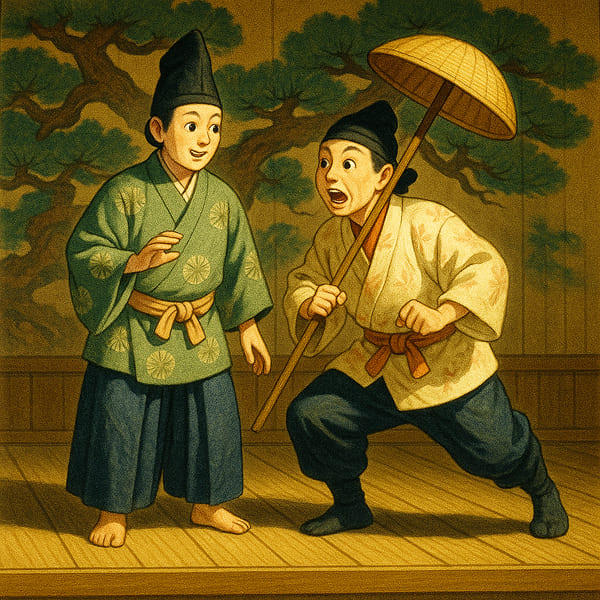Kyōgen: Japan’s Traditional Comedy Theater Full of Wit and Everyday Life

Contents
A stern stage. A solemn silence. And suddenly—a mischievous servant, a bumbling lord, and a burst of laughter.
Welcome to Kyōgen: Japan’s classical comedy where everyday absurdities take center stage.
Performed alongside the solemn, spiritual world of Noh, Kyōgen offers a refreshing shift—from gods and ghosts to farmers, fools, and quirky families. With sharp dialogue, expressive faces, and stories pulled straight from medieval daily life, Kyōgen reveals timeless truths through well-crafted comedy.
It’s not just slapstick—it’s satire with centuries of tradition.
If Noh is a poetic meditation, Kyōgen is the punchline that follows.
Facial Expressions over Masks, Words over Songs
Unlike Noh, Kyōgen performers generally do not wear masks, allowing their facial expressions and vocal delivery to play a central role in generating laughter (although masks may be used for specific roles such as elderly characters or deities). The dialogue-driven nature of Kyōgen, rather than singing and dancing, sets it apart. Though the language is classical Japanese, modern performances often include subtitles or explanations to help audiences understand and enjoy the story.
The Role of Aikyōgen in Noh
Kyōgen is not only performed independently, but also appears as aikyōgen, short comedic interludes within Noh plays. These segments clarify complex storylines, offer comic relief, and enhance the overall theatrical experience by contrasting with the seriousness of the main Noh performance. This interplay between solemnity and humor is one of the unique features of Japanese traditional theater.
Wisdom Through Laughter That Transcends Time
With a history of over 600 years, Kyōgen continues to entertain and enlighten audiences today. Despite its classical appearance, the universal themes of human folly, cunning, and humor still resonate. It has influenced contemporary theater and even anime, offering insight into the roots of Japanese comedic culture and the enduring power of laughter.